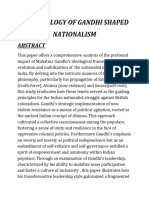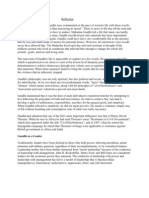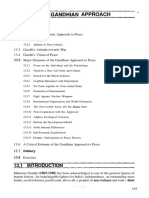0 ratings0% found this document useful (0 votes)
53 viewsPS-II (BLLB-202) Unit-V - (3) - 060408
PS-II (BLLB-202) Unit-V - (3) - 060408
Uploaded by
Saquib khanGandhi was a prominent Indian philosopher and leader of the Indian independence movement. He developed a philosophy of non-violent civil disobedience to resist unjust laws and authority. Gandhi criticized Western civilization and democracy for exploiting weaker groups and promoting unlimited capitalism. He believed swaraj involved both political and human emancipation. True democracy was only possible through non-violence. Gandhi advocated for self-reliant village economies based on spinning wheels and homespun cloth over large-scale industrialism.
Copyright:
© All Rights Reserved
Available Formats
Download as PDF, TXT or read online from Scribd
PS-II (BLLB-202) Unit-V - (3) - 060408
PS-II (BLLB-202) Unit-V - (3) - 060408
Uploaded by
Saquib khan0 ratings0% found this document useful (0 votes)
53 views31 pagesGandhi was a prominent Indian philosopher and leader of the Indian independence movement. He developed a philosophy of non-violent civil disobedience to resist unjust laws and authority. Gandhi criticized Western civilization and democracy for exploiting weaker groups and promoting unlimited capitalism. He believed swaraj involved both political and human emancipation. True democracy was only possible through non-violence. Gandhi advocated for self-reliant village economies based on spinning wheels and homespun cloth over large-scale industrialism.
Original Title
PS-II (BLLB-202) Unit-V-(3)_060408
Copyright
© © All Rights Reserved
Available Formats
PDF, TXT or read online from Scribd
Share this document
Did you find this document useful?
Is this content inappropriate?
Gandhi was a prominent Indian philosopher and leader of the Indian independence movement. He developed a philosophy of non-violent civil disobedience to resist unjust laws and authority. Gandhi criticized Western civilization and democracy for exploiting weaker groups and promoting unlimited capitalism. He believed swaraj involved both political and human emancipation. True democracy was only possible through non-violence. Gandhi advocated for self-reliant village economies based on spinning wheels and homespun cloth over large-scale industrialism.
Copyright:
© All Rights Reserved
Available Formats
Download as PDF, TXT or read online from Scribd
Download as pdf or txt
0 ratings0% found this document useful (0 votes)
53 views31 pagesPS-II (BLLB-202) Unit-V - (3) - 060408
PS-II (BLLB-202) Unit-V - (3) - 060408
Uploaded by
Saquib khanGandhi was a prominent Indian philosopher and leader of the Indian independence movement. He developed a philosophy of non-violent civil disobedience to resist unjust laws and authority. Gandhi criticized Western civilization and democracy for exploiting weaker groups and promoting unlimited capitalism. He believed swaraj involved both political and human emancipation. True democracy was only possible through non-violence. Gandhi advocated for self-reliant village economies based on spinning wheels and homespun cloth over large-scale industrialism.
Copyright:
© All Rights Reserved
Available Formats
Download as PDF, TXT or read online from Scribd
Download as pdf or txt
You are on page 1of 31
PS-II BLLB-202-Unit-V (C)
M.GANDHI & J.NEHRU
CRITIQUE OF COLONIALISM
M. GANDHIJI (1869-1948)
MK Gandhi was an Indian social and moral philosopher as well as
the father of our nation. His social and political thought is broadly
described as Gandhism.
He did not write any treatise on his philosophy. As a moral
philosopher, Gandhi treated ethics as the guiding star of all human
behaviour, including politics.
Gandhi’s thought is scattered in a large number of notes and tracts
pamphlets, articles, booklets, letters, speeches, editorials as well as
his Autobiography (My Experiments with Truth-1929).
The contribution of Gandhiji to Indian national movement was
unparalleled.
He made the Indian National Congress a people’s congress and the
national movement a mass movement.
Gandhi’s social and political thought is multidimensional.
His political ideology was a radical departure from the past in the
sense that it was neither constitutional loyalist of the Moderates
nor extremism of the revolutionary leaders.
His social and political ideas were the outcome of his serious engagement
with issues reflective of India’s peculiar socio-economic circumstances.
Gandhi simultaneously launched movements not only against the
colonial rule but also against the atrocious social structures, customs,
norms and values, justified in the name of Indian’s age-old traditions.
Hence, Gandhi’s thought is neither purely political nor absolutely social,
but a complex mix of both.
Gandhian philosophy was a profound engagement with modernity and its
pitfalls.
Against the evils of industrialisation, materialism and selfish pursuits,
Gandhi suggested swaraj, swadeshi, trusteeship and a minimal state with
coordination.
He was a religious man, and this perspective shaped his political and
economic ideas of society.
He did not agree that religion should be separated from politics.
According to Gandhi, man’s ultimate aim is the realisation of God, and all
his activities, social, political & religious have to be guided by the
ultimate aim of the vision of God.
It is only through the means of self-purification that self-realisation can
be attained.
To him the moral discipline of the individual is the most important means
of social construction.
Gandhi invoked the five-fold moral principles: truth, non-violence, non-
stealing, non-possession and celibacy.
The observance of these moral principles would purify man and enable
him to strive after self-realisation.
Means and End:
Gandhi said that if we take care of our means, end will take care of
itself.
Only the right type of seed will grow into the right type of tree. As
you sow, so shall you reap.
Means and ends are the two side of the same coin.
Immoral means cannot be used to achieve moral ends.
Wrong way can never lead to the right destination.
He considered that ends and means are integral to each other.
Truth as end and non-violence as means are inseparable.
SATYAGRAHA: (RELIANCE ON THE FORCE OF TRUTH):
Satyagraha or holding onto truth or truth force is a particular form
of nonviolent resistance or civil resistance.
Satyagraha means the exercise of the purest soul-force against all
injustice, oppression and exploitation.
Gandhi adopted the path of Satyagraha for achieving the goal of
swaraj.
Because this path was as sacred as its destination.
Satyagraha involved the practice of ahimsa (non-violence) which
embodied the right course of action.
NON-VIOLENCE (AHIMSA):
Devotion to truth is the essence of Gandhism. Non-violence is the part of
the pursuit of truth.
Non-violence or non-injury (ahimsa) literally means abstention from
violence in one’s behaviour toward other living beings. It also means love
of all.
We should extend our love not only to those who love us but also to those
who hate us.
Love of the hater is the most difficult of all. Non-violence is not the resort
of the weak but is the power of the strong with moral power. This power
comes from the firm adherence to truth.
In short, non-violence is the art of gaining victory over physical force by a
spiritual force.
Non-violence is the method of self-purification. Practitioner of no-violence
gains ample power to defeat the forces of untruth.
SPIRITUAL, ETHICAL AND RELIGIOUS:
For Gandhi, the terms spiritual, religious, and moral or ethical means
the same idea.
They taught man to abstain from immorality and follow the path of
virtue.
According to Gandhi, the essence of religions was identical. All
religious God are same not different and no religion was superior or
inferior to any other religion.
All religions taught devotion and charity toward fellow-beings.
Religious tolerance was the keynote of social harmony.
For Gandhi, adherence to religion was the part of his pursuit of truth.
In short, politics and ethics were inseparable in Gandhian system of
thought.
DOCTRINE OF TRUSTEESHIP: Gandhi believed in simple living at the
level of production as well as consumption.
He gave primacy to simple technology over heavy industries.
Simple technology had the capacity of mass employment, whereas
advanced technology would create vast unemployment in a country
like India and promote consumerism with all its ill effects.
On his doctrine of Trusteeship, Gandhi urges to the landlords and
capitalists not to consider themselves as the sole owner of their
possessions, but only as ‘trustees’ of a gift bestowed upon him by God
for the service of humanity.
Gandhi realized that the prevailing system had become oppressive
because of moral decline.
If the rich people ready to work for the public, they would win wide
public respect instead of the existing hatred.
The feeling of class conflict would be replaced by the sentiment of
class cooperation.
Gandhi wants ‘change of heart’ of the rich and resourceful persons
to enable the society to have full benefit of their talents and efforts
without suffering injustice caused by the exploitation of the poor by
the rich.
LIMITS OF POLITICAL OBLIGATION
Gandhi recognized several limits of political obligation, as his
principle of ‘civil disobedience’ indicates.
Civil disobedience implies deliberately disobeying an unjust
authority and breaking an unjust law.
The duty of civil disobedience to an unjust law is the counterpart of
the duty of civil obedience to a just law.
Civil disobedience may be resorted to as a protest against an unjust
policy of government or in order to draw attention of the
government to a demand for political reform.
M. Gandhi sought to combine the principle of civil disobedience
with his principle of non-violent struggle and satyagraha (the
principle of reliance on the force of truth) during India’s struggle for
independence.
Gandhi firmly believed that civil disobedience was based on a profound
respect for law in general; only unjust law should be broken—that too
when all methods of persuasion and petition for withdrawal of such law
had been tried and had failed.
The act of civil disobedience should be performed non-violently and in
full public view; and penalties entailed by this act should be accepted
willingly.
The true object of civil disobedience is ‘change of heart’ of the authorities
concerned. This should be resorted to only against a tyrannical regime,
foreign ruler or unjust government.
If a govt generally maintains the citizen’s rights and can be influenced
through democratic means, resort to civil disobedience will not be
necessary.
Civil disobedience should not be resorted to for pressing the demands of
any particular section against the general or public interest.
CRITIQUE OF COLONIALISM OR WESTERN CIVILISATION
Gandhiji was highly critical of both western civilisation and western
democracies.
He challenged the foundations of modern western civilisation. The
modern civilisation was equivalent to darkness and disease.
He condemned bitterly western democratic politics because they
were infected with contradiction.
They believed in the limitless expansion of capitalism, and this
resulted in the exploitation of the weaker sections of society.
He frankly stated that it was not through democratic methods that
Great Britain had conquered India.
He also criticised the policy of racialism followed in South Africa and
in the southern parts of the USA.
Gandhi stressed that non-violence could lead to true democracy.
Democracy and violence could not be reconciled.
According to Gandhi swaraj was not merely political liberation; it
means human emancipation as well.
In his own words, ‘mere withdrawal of the English is not
independence. It means the consciousness in the average villages
that he is the maker of his own destiny, that he is his own legislator
through his own representatives’.
The real swaraj, he felt, will come not by the acquisition of authority by a
few but by the acquisition of the capacity by all to resist authority when
abused.
Swaraj is the power of the people to determine their life by their own
efforts and shape their destiny the way they like.
Swaraj is to be attained by educating the masses to a sense of their
capacity to regulate and control authority.
Economic swaraj stands for social justice, it promotes the good of all
equally including the weakest, and is indispensable for decent life.
For Gandhiji, India’s economic future lay in charkha (Spinning Wheel) and
Kadhi (Homespun cotton textile).
If India’s villages are to live and prosper, the charkha must become
universal’. He emphasised the revival of village crafts”.
He regarded the villages as the centre of Indian economic
organisation.
He opposed large scale industrialism and mechanization, and
condemned western commercialism and imperialism as disease.’
For Gandhi, the idea of Swaraj was not confined to the political goal of
securing independence from foreign yoke.
It also implied regeneration of the individual himself—the process of
‘self-control’, self-discipline’ and ‘self-purification’ which must
continue even after the independence.
In short, Gandhi’s swaraj means national independence, political
freedom of the individual, economic freedom of the individual and
spiritual freedom of the individual or self-rule.
CONCLUSION
Commitment to the common good is the essence of Ghandian
philosophy.
Gandhi’s technique of struggle against the mighty British Empire was
throughout based on the principle of non-violence.
His method of Civil Disobedience and Satyagraha was strongly based
in non-violence.
His doctrines of Trusteeship and the vision of a classless society are
also the manifestation of his adherence to truth and non-violence.
He made the Indian liberation movement into a mass movement.
Gandhi saw India’s independence as an opportunity ‘to wipe every
tear from every eye.’
He wished to transform the destiny of India at a critical juncture
through moral regeneration.
It was a time when India was struggling under an oppressive foreign
rule, abject poverty, vast social and economic inequalities. Further it
was also in the grip of communal tension and hatred.
His teaching of Satyagraha and non-violence are greatly relevant to
the modern world infected with corruption, terrorism, power
politics and intolerance.
Gandhi preached the gospel of spiritualism, non-violence, non-
possession, trusteeship, moral courage, and so on for the uplift of
man as well as society.
PANDIT JAWAHARLAL NEHRU
PANDIT JAWAHARLAL NEHRU (1889-1964)
Pandit Jawaharlal Nehru (1889-1964) was a freedom fighter and
seasoned statesman of modern India. He was not just the architect of
modern India. He also played a central role in the discrediting of
European imperialism and colonialism.
In 1947 when India became independent, Nehru became its first Prime
Minister and retained this position till his death in 1964.
Apart from his outstanding role in national and international affairs,
Nehru displayed his extraordinary talent as a writer.
Nehru made a mark as a historian and political commentator.
Nehru’s Autobiography (1936), Glimpses of World History (1939),
Discovery of India (1946) and his innumerable articles, letters and
speeches may be treated as the source of his political thought.
NEHRU’S IDEA OF NATIONALISM
J. Nehru is regarded a great nationalist leader of India. However, his idea
of nationalism was different from other important nationalist leaders of
modern India.
Nehru’s nationalism was inspired by its historical foundation.
J. Nehru warned that feeling proud of the heritage and achievements of
one’s nations should not be accompanied by disdain for other nations.
He argued that it would be a folly to discard other nations in the name of
nationalism.
The slogan of ‘My nation is right or others are wrong’ represents a
distorted view of nationalism. National prejudice often comes in the way
of our judgement when we forget to discriminate between right and
wrong.
Genuine nationalism requires that all nations should follow the path
of justice and morality, and all nations should strive to make due
contribution to the progress of humanity.
If different nations come together and try to learn constructively
from each other’s legacy, each of them would be a gainer, and all of
them would be contributing to building a humanist world order.
In this respect, Nehru’s nationalism was strongly influenced by the
idea of ‘synthetic universalism’ as evolved by Rabindranath Tagore.
Synthetic universalism refers to the principle which seeks to join
nationalism with internationalism and thereby promote humanism.
NEHRU’S VIEW OF SECULARISM
J. Nehru was an ardent champion of the Indian view of secularism.
In a multi-religious society like India, Nehru defined secular state as
a state that protects all religions but does not favour any one at the
expense of the other.
It does not adopt any religion as the state religion. During
independence movement of India, Nehru drafted Congress
Resolution on Fundamental Rights (1931) which stated that the
state should observe neutrality in regard to all religions.
In his speech Nehru said, we have laid down in our constitution that
India is a secular State. That does not mean irreligion. It means
equal respect for all faiths and equal opportunities for those who
profess any faith.
Nehru believed in a broader vision of religion which infused a moral spirit
and social service into the people of India.
However, he insisted on liberating religion from the shackles of blind faith,
dogma and bigotry.
Nehru strongly condemned those forms of religion which sow the seeds of
hatred between different religious communities.
Hatred between different religious communities takes the form of
communalism. It comes in very handy to those politicians who seek to take
advantage of people’s diverse religious affinities.
The alliance of religion and politics in the shape of communalism is a most
dangerous alliance against the nation.
The remedy of communal tension could be found by adopting proper
education, economic policy, secular policy etc and not by instigating
communal riots.
CRITIQUE OF COLONIALISM
As champion of world peace, Nehru opposed colonialism. He
wanted freedom for every nation. British colonial hegemony over
India was hated by Nehru from the core of his heart.
India's anti-colonialism is deeply connected to the national interest
and principles of foreign policy.
India has been victim of colonialism and racism and was as such
opposed to these evils in any form. India considers colonialism and
imperialism as the threat to international peace and security
Suppression to people’s freedom and liberty is a heinous crime.
Nehru wanted to discard colonialism because it invade the liberty
and freedom of the people.
The Indian experience of colonial rule is probably the longest of all other
nations of Asia and Africa.
A champion of human freedom, Nehru opposed colonialism in his foreign
policy and it received high praise from many of the newly independent
countries.
These new member states/countries had a few characteristics in common;
they were non-white, with evolving economies, facing internal problems
that were the result of their colonial past.
This often put them at odds with European countries and made them
suspicious of European-style government structures, political ideas and
economic institutions.
These nations felt that they were excluded from the decision made by the
western nations and desired to have an organization which reflected their
concerns.
After two centuries of British rule, Nehru was determined to protect
the country’s strategic autonomy without compromising
independence by aligning itself to either superpower in the Cold
War.
This policy of NAM, made India one of the most
distinguished leaders of Third World solidarity, reached out to the
rest of the colonised world, and forged a joint front against
colonialism and imperialism.
Nehru and Gandhi rallied anti-colonial leaders, holding the Asian
Relations Conference in New Delhi in 1947 to chart the way forward
for the continent.
In Nehru’s view, Asia’s newly liberated or soon-to-be liberated states
should show the world a different way to conduct international
relations.
They need not be suspicious of each other’s intentions, nor greedy
for each other’s territory, Nehru argued.
And they should not waste their scarce resources on building
armies or atom bombs.
Committed to social and economic development and to treating
others with mutual respect, they could—and should—create a more
just and peaceful world.
CONCLUSION
Nehru was an ardent champion of democracy and socialism. His political ideas
are powerful statements on India’s evolution as an independent nation-state
after a protracted struggle against colonialism.
Nehru’s political thought is full of brilliant insights for achieving the goals of
economic as well as political democracy, particularly in contemporary India.
It was Nehru who, by his scrupulous regard for both the form and the
substance of democracy, instilled democratic habits in our country.
His respect for Parliament, his regard for the independence of the judiciary, his
courtesy to those of different political convictions, his commitment to free
elections, and his deference to institutions over individuals, all left us a
precious legacy of freedom.
The fears of growing intolerance, communalism and inequality which may
disrupt social harmony; debates in Indian intelligentsia about the erosion of
democratic values, freedom of speech and autonomy of public institutions; the
emergence of various issues at global level, marks the relevance of Nehruvian
ideology even today.
Thank You..
You might also like
- EF4e Intplus Filetest 7aDocument7 pagesEF4e Intplus Filetest 7aLorena RiveraNo ratings yet
- My Understanding of GandhiDocument11 pagesMy Understanding of GandhiNeha PintoNo ratings yet
- Mahatma GandhiDocument4 pagesMahatma Gandhiadev33462No ratings yet
- Vaibhav Civil PresentationDocument5 pagesVaibhav Civil PresentationAmitesh SinghNo ratings yet
- Manoj GandhiDocument23 pagesManoj GandhiQueenNo ratings yet
- Relevance of Gandhian Philosophy in Contemporary PeriodDocument12 pagesRelevance of Gandhian Philosophy in Contemporary PeriodJAMESJANUSGENIUS5678100% (1)
- mgp 004Document61 pagesmgp 004Sri ram charan tejNo ratings yet
- Ethics - Internal Assesment 2Document5 pagesEthics - Internal Assesment 2UTTARA NAIRNo ratings yet
- Political Science Winter 2020Document8 pagesPolitical Science Winter 2020HeenaNo ratings yet
- SatyagrahaDocument26 pagesSatyagrahaSahajPuriNo ratings yet
- How Ideology of Gandhi Shaped NationalismDocument17 pagesHow Ideology of Gandhi Shaped Nationalismchetalimorwal81No ratings yet
- Heritage2018 14 19 MahatmaGandhiDocument6 pagesHeritage2018 14 19 MahatmaGandhiQueenNo ratings yet
- Hind Swaraj ReviewDocument4 pagesHind Swaraj Reviewyogendra choukiker0% (1)
- Unit 7Document10 pagesUnit 7Princy MaheshwariNo ratings yet
- Gandhi PLB452 Assignment 2Document7 pagesGandhi PLB452 Assignment 2ABDUL AHAD CHOWDHURYNo ratings yet
- Gandhiji PhilosophyDocument4 pagesGandhiji PhilosophySania SiddiquiNo ratings yet
- ReflectionDocument3 pagesReflectionyssumaNo ratings yet
- Class - Test - 2 - Politics and NonviolenceDocument8 pagesClass - Test - 2 - Politics and NonviolenceADITYA SONINo ratings yet
- Mahatma GandhiDocument9 pagesMahatma Gandhiftdfg1346No ratings yet
- Gandhi As A Political Strategist PDFDocument3 pagesGandhi As A Political Strategist PDFIndie BotNo ratings yet
- Gandhi SummaryDocument3 pagesGandhi SummaryNang Suchittra MantawNo ratings yet
- Gandhian Strategy-The Exclusive Mantra For Solving Problems in Modern Context - Articles On and by GandhiDocument7 pagesGandhian Strategy-The Exclusive Mantra For Solving Problems in Modern Context - Articles On and by Gandhideepak100% (1)
- A Study On Gandhian Philosophy Chapter - 1: Roll No.: 61403U07006Document15 pagesA Study On Gandhian Philosophy Chapter - 1: Roll No.: 61403U07006Subhendu Ghosh100% (1)
- Mohandas Karamchand GandhiDocument18 pagesMohandas Karamchand GandhiDevendra DewasthaleNo ratings yet
- Document 1Document2 pagesDocument 1Preeti SoniNo ratings yet
- Relevance of Gandhian Principles in Contemporary India: HistoryDocument2 pagesRelevance of Gandhian Principles in Contemporary India: HistoryshashankNo ratings yet
- Gandhi - SwarajDocument3 pagesGandhi - SwarajHriday MeghaniNo ratings yet
- 08 Chapter 3Document64 pages08 Chapter 3Shashank PathakNo ratings yet
- Unit 4 BDocument10 pagesUnit 4 BR20PLP020 Kavya Reddy YNo ratings yet
- ApproachesDocument22 pagesApproachesrevathisankarNo ratings yet
- Unit 5Document10 pagesUnit 5foxinternationalriceNo ratings yet
- The Gandhian ApproachDocument14 pagesThe Gandhian ApproachDevendrapratapdp0% (1)
- Gandhi's Concept of Nonviolence and PacifismDocument6 pagesGandhi's Concept of Nonviolence and PacifismRaghvendra Singh Khichi100% (1)
- rajul kajot PS22089Document7 pagesrajul kajot PS22089kajotrajulNo ratings yet
- Gandhi's PhilosophyDocument5 pagesGandhi's Philosophyudaywal.nandiniNo ratings yet
- Mahatma GandhiDocument5 pagesMahatma Gandhiabdul.rahmanprivate.box2022No ratings yet
- Gandhi AssignmentDocument6 pagesGandhi AssignmentalphaalphaalphaNo ratings yet
- Gandhian PrinciplesDocument6 pagesGandhian Principlestweshamishra16No ratings yet
- Assignment of Second Internal of Foundation of EthicsDocument8 pagesAssignment of Second Internal of Foundation of EthicsSanket MNo ratings yet
- Essay Writing Competiton Organised by Acp Dibrugarh University UnitDocument6 pagesEssay Writing Competiton Organised by Acp Dibrugarh University UnitAKASH KALITANo ratings yet
- Gandhian Approach PDFDocument14 pagesGandhian Approach PDFPreetiNo ratings yet
- GANDHIJIDocument11 pagesGANDHIJIVanshika GaurNo ratings yet
- Assignment POL SCIENCE 3Document10 pagesAssignment POL SCIENCE 3khushwant DhakadNo ratings yet
- Unit-2 Gandhi's Views On StateDocument10 pagesUnit-2 Gandhi's Views On Statemd chishtyNo ratings yet
- LAWPBALLB209944rStarPr - Gandhian PrinciplesDocument3 pagesLAWPBALLB209944rStarPr - Gandhian PrinciplesSri MuganNo ratings yet
- Non ViolenceDocument4 pagesNon ViolencezchoudhuryNo ratings yet
- Truth and Non-Violence: The Foundations of Gandhian PhilosophyDocument2 pagesTruth and Non-Violence: The Foundations of Gandhian PhilosophyinventionjournalsNo ratings yet
- Political Science NotesDocument10 pagesPolitical Science NotesSonakshi SinhaNo ratings yet
- Mahatma Gandhi in New India: A Study From The Political Aspects Dr. Rajbir Singh & MonikaDocument11 pagesMahatma Gandhi in New India: A Study From The Political Aspects Dr. Rajbir Singh & MonikaSocial VisionNo ratings yet
- 147-Article Text-250-1-10-20211124Document9 pages147-Article Text-250-1-10-20211124thetroyy44No ratings yet
- Gandhi's Satyagraha Anf and The Nature of The StateDocument10 pagesGandhi's Satyagraha Anf and The Nature of The StateHosen AliNo ratings yet
- SwarajDocument4 pagesSwarajahanaNo ratings yet
- Gandhiji AhimsaDocument1 pageGandhiji AhimsamrohitmahatovictusNo ratings yet
- ModratessDocument20 pagesModratessjai sreeNo ratings yet
- Gandhi (Ipt)Document38 pagesGandhi (Ipt)Abhay SinghNo ratings yet
- Gandhi Today: A Report on India's Gandhi Movement and Its Experiments in Nonviolence and Small Scale Alternatives (25th Anniversary Edition)From EverandGandhi Today: A Report on India's Gandhi Movement and Its Experiments in Nonviolence and Small Scale Alternatives (25th Anniversary Edition)No ratings yet
- PS-II (BLLB-202) Unit-V - (2) - 060312Document39 pagesPS-II (BLLB-202) Unit-V - (2) - 060312Saquib khanNo ratings yet
- Legal Language:Origin, Nature and ScopeDocument20 pagesLegal Language:Origin, Nature and ScopeSaquib khanNo ratings yet
- Wa0003.Document13 pagesWa0003.Saquib khanNo ratings yet
- Study Material Sociology-Ii Unit-I Secularism: DR M.Kalimullah Assistant Professor Department of LawDocument13 pagesStudy Material Sociology-Ii Unit-I Secularism: DR M.Kalimullah Assistant Professor Department of LawSaquib khanNo ratings yet
- Unit II... Charcteristics of Legal Language 2 PDFDocument16 pagesUnit II... Charcteristics of Legal Language 2 PDFSaquib khanNo ratings yet
- Contract U-IIDocument25 pagesContract U-IISaquib khanNo ratings yet
- Malicious-Prosecution RemovedDocument14 pagesMalicious-Prosecution RemovedSaquib khanNo ratings yet
- Socio Sem 2Document7 pagesSocio Sem 2Saquib khanNo ratings yet
- Camden Rooney - Symbolism TrackerDocument4 pagesCamden Rooney - Symbolism Trackerapi-755795870No ratings yet
- Rule of The ThirdDocument2 pagesRule of The ThirdUranusNo ratings yet
- Destination C1 and C2Document52 pagesDestination C1 and C2Uy DgNo ratings yet
- Premium Combo 1Document339 pagesPremium Combo 1BonanaNo ratings yet
- Writing Unit 6Document2 pagesWriting Unit 6mar.forteaespinosaNo ratings yet
- 2.2 Graphical Solution Procedure: Prepared By: Nokom, Armie & Notarte, NoveDocument17 pages2.2 Graphical Solution Procedure: Prepared By: Nokom, Armie & Notarte, Novenatalie clyde matesNo ratings yet
- Mythology Lecture NotesDocument51 pagesMythology Lecture Notesalexpearce92No ratings yet
- Geeta LessonsDocument10 pagesGeeta LessonsishwarmayumNo ratings yet
- The Health Consequences of Human TraffickingDocument36 pagesThe Health Consequences of Human TraffickingWardiati YusufNo ratings yet
- MBA Mock Trial Program Mock Trial BasicsDocument18 pagesMBA Mock Trial Program Mock Trial Basicslinuspauling101No ratings yet
- Sonali Shrivastav - New - HRDocument4 pagesSonali Shrivastav - New - HRRavi KumarNo ratings yet
- PsychologyDocument38 pagesPsychologyChinyeaka John OnamNo ratings yet
- LESSON 21 - at The HospitalDocument3 pagesLESSON 21 - at The HospitalThanh VyNo ratings yet
- Centennial Book - We CelebrateDocument19 pagesCentennial Book - We CelebrateFuegodeCabugaoNo ratings yet
- Previous Conventional Questions W Ith Answ Ers: ForceDocument9 pagesPrevious Conventional Questions W Ith Answ Ers: ForceramNo ratings yet
- PDF Forensic Psychology: The Basics, 3rd Edition Sandie Taylor downloadDocument65 pagesPDF Forensic Psychology: The Basics, 3rd Edition Sandie Taylor downloaducedacerangi100% (1)
- AcidDocument14 pagesAcidTochits MatiasNo ratings yet
- Under Imperialism Black Lives Don T Matter Ho Chi Minh The Black Race and Black LiberationDocument9 pagesUnder Imperialism Black Lives Don T Matter Ho Chi Minh The Black Race and Black LiberationRobot MateNo ratings yet
- Artificial Intelligence B2 TVDocument6 pagesArtificial Intelligence B2 TVCarolineNo ratings yet
- 003 Tower Nonlinear Dynamic Response of Cable-Stayed Bridges Under Great Earthquake Ground MotionDocument4 pages003 Tower Nonlinear Dynamic Response of Cable-Stayed Bridges Under Great Earthquake Ground MotionjaswantNo ratings yet
- PRESENT SIMPLE - SystematizationDocument2 pagesPRESENT SIMPLE - Systematizationfederico trujilloNo ratings yet
- U8 TEST A gr1Document2 pagesU8 TEST A gr1Iwona BabulewiczNo ratings yet
- Tle 6Document2 pagesTle 6Daisy PascuaNo ratings yet
- MODE OF LEARNING ScriptDocument1 pageMODE OF LEARNING ScriptMavis Prejillana AllauiganNo ratings yet
- 978 1 8471 8638 6 SampleDocument30 pages978 1 8471 8638 6 SampleWilliam MahendraNo ratings yet
- Dorgelo ThesisDocument298 pagesDorgelo ThesisBiswajit DasNo ratings yet
- The Seven-Step Problem Solving Method 20080220Document52 pagesThe Seven-Step Problem Solving Method 20080220dzedfzefzefzeNo ratings yet
- b1 Lines Written in Early SpringDocument8 pagesb1 Lines Written in Early Springsahej48007No ratings yet
- Final Capstone Proposal DocumentDocument2 pagesFinal Capstone Proposal Documentapi-510598818No ratings yet

































































































